Always Sometimes Monsters Review
You know, Devolver Digital, I thought I knew where you stood. I looked at the likes of Serious Sam 3, Shadow Warrior and Hotline Miami, and I saw a publisher that could spot a brutal balls-out action game from three miles away. So, when I heard about Always Sometimes Monsters, I was understandably confused when it was not, as I had initially expected upon hearing the name, a high-octane spiritual successor to Altered Beast, but rather more something that somebody had apparently put together in RPG Maker. “This intrigues me,” I said to myself, stroking the goatee of a confused passer-by in the absence of my own. “What could such a game do to break the surface and raise itself above the fetid waist-deep slurry of Final Fantasy rip-offs?” Quite a lot, as it turns out.
For starters, Always Sometimes Monsters isn’t an RPG – or if it is, it’s an RPG in the same sense as Consortium, where there aren’t strictly any RPG elements but you’re nevertheless contributing to the development of a character through your actions. If anything, I’d describe it as an interactive narrative; a choose-your-own-adventure along the lines of The Stanley Parable, where the central mechanic consists of making choices that manipulate the plot in subtle and not-so-subtle ways. Don’t let the presentation fool you: it’s a gritty, contemporary, surprisingly confrontational tale, about as far away as you could get from the gaudy escapist fantasy that this format has traditionally supported. Sex and drugs and rock ‘n roll, as the saying goes, but also poverty, wealth, marriage, subterfuge, love and blackmail. There are indeed monsters, in a manner of speaking, but they wear human faces.
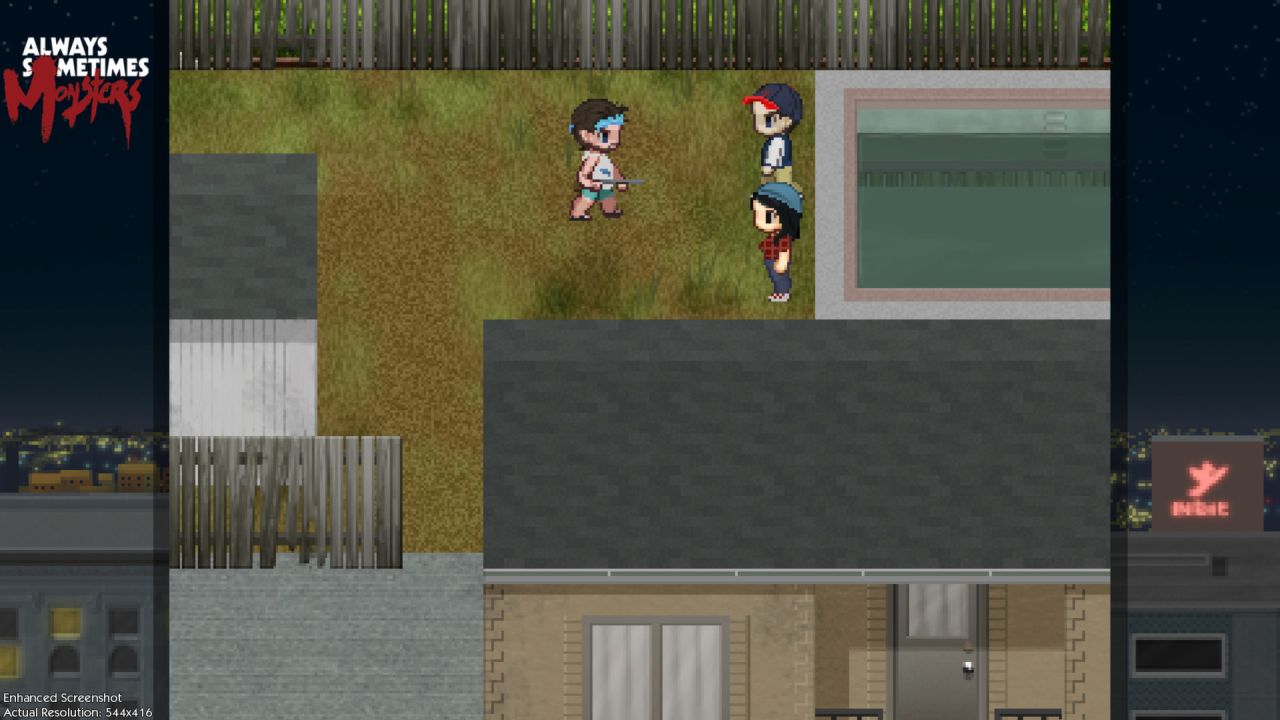
Most of the above manage to show themselves in the prologue, which doubles up as a sort of character selection system. A wealthy publishing agent has thrown a party for a bunch of trendy twenty-something urbanites, hoping to pick out an aspiring writer to strike a deal with, and lo and behold, you’re the lucky one. The game frames the selection process – where you pick your character and their romantic partner – as a series of conversations and perspective switches, and it’s quite a clever little touch if nothing else. As far as I can tell, who you actually pick is entirely skin-deep, only affecting appearances and some of the dialogue, and there’s a reasonably diverse selection of characters on display. Can’t play as the pets, though. That loses you ten points by the way, Vagabond Dog.
Fast forward a year and – because something has to go drastically wrong, obviously – your life has collapsed. You’re still a writer, but now you’re nearly broke, your publishing cheque is paying peanuts, you’re about to lose your apartment and you’re still wearing the same clothes. Ah, a character I can relate to, at last. As if it wasn’t enough, your now-estranged partner is getting married on the other side of America to a mystery individual, and just to rub salt in the wounds, they’ve sent you an invite. With nothing else to do – you know, what with being unemployed and not owning a computer – you set your sights on crossing the country with the purpose of… wait, why are we doing this, anyway? Are we really that attached to them?
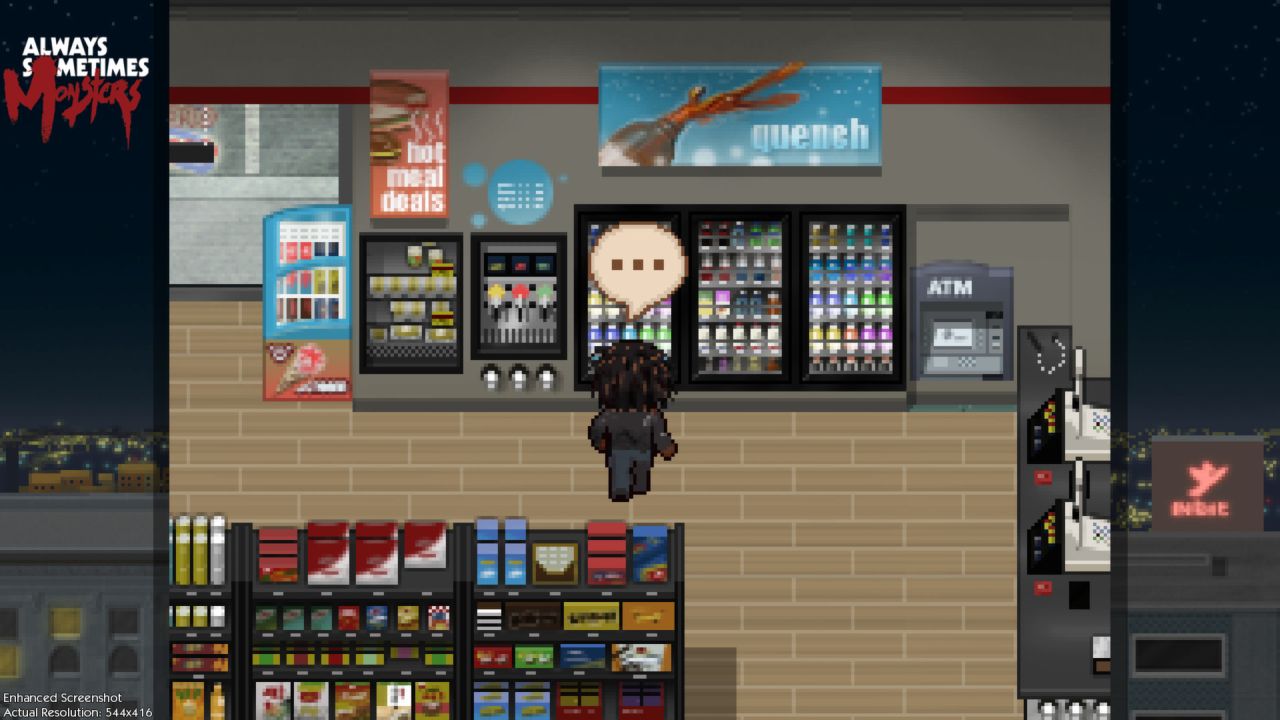
Apparently we are. I know video games have had plenty of trouble introducing the love interest character in the past – stopping just short, in some cases, of barking “you love this woman, now go brave untold monstrosities on the off-chance that you might save her” in your ear – but I was expecting something a bit more in-depth from Always Sometimes Monsters. We’ve exchanged about three lines of dialogue with this person since the game began, but somehow we’re supposed to be so desperately smitten with their static character portrait that an impromptu cross-country trip seems justified. Later on they get fleshed out a bit through various flashbacks, but it just isn’t enough to make them feel like anything more than a MacGuffin. How exactly are we supposed to enjoy a character drama when one of the characters spends most of the game several hundred miles away and never answers the bloody phone?
So, the pointless cross-country trip. You have thirty in-game days to make it to the wedding by any means possible, earn yourself as much money as you can, and – most importantly – not die. Along the way you’ll get tangled up in more trouble than anybody would believe possible, make decisions on how to manage it, and deal with the resulting outcomes. There’s something of a survival mechanic early on, where your stamina intermittently drains whenever time advances, but food is cheap and player characters in this universe are apparently so durable that they can survive entirely on two sandwiches a day, so it quickly becomes irrelevant, leaving you to concentrate on the meat of the game: choosing between two dubious options on a menu.
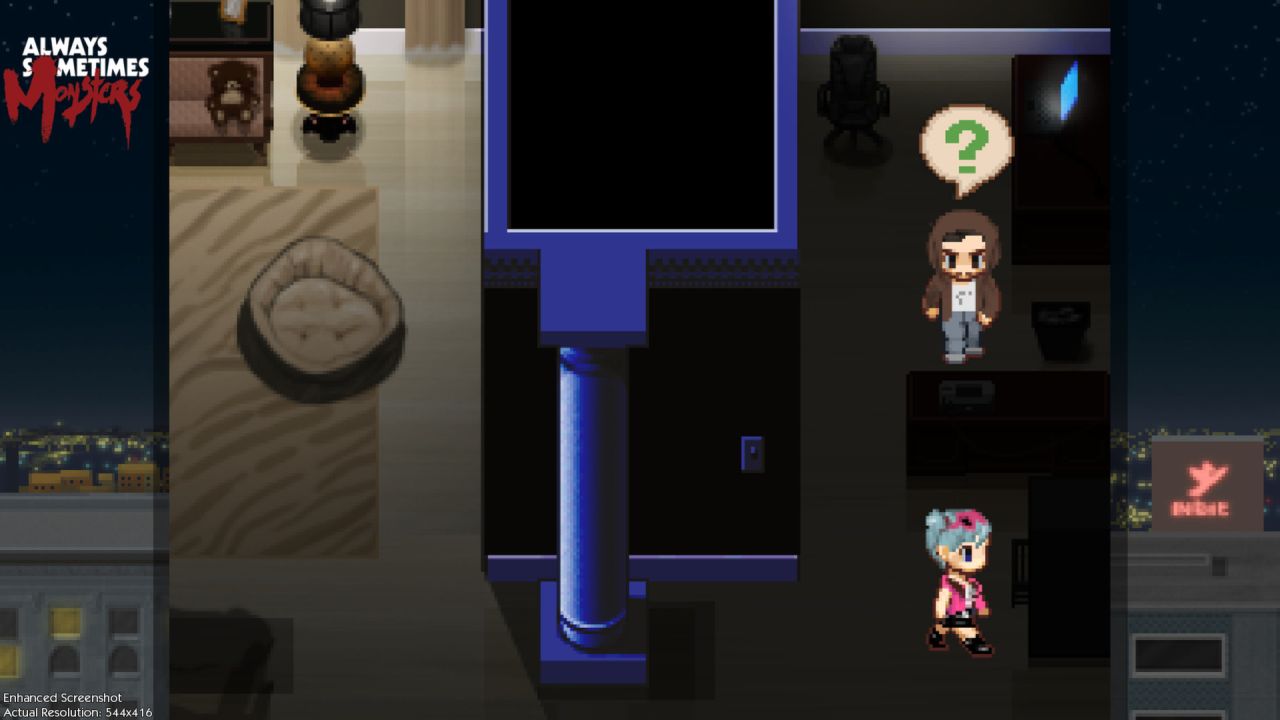
Choice is at the centre of Always Sometimes Monsters, constantly altering the plot in ways that may not even become apparent until you try another playthrough. At every turn, you’re assaulted with choices, and it’s really quite remarkable to behold how the plot changes depending on how you handle them. A lot of games have claimed that ‘every choice has consequences’ – I’m pretty sure I’m unintentionally quoting something there – and few have ever followed up with that claim with something more than maybe granting you a different weapon here and there, but Always Sometimes Monsters is different. While the plot is always moving more or less in the same direction, the path you take can vary massively. Of course, the idea with this sort of game is that you’re supposed to play through it several times over to marvel at how much things can change, and that’s all very well – even taking into account that it’s around eight to ten hours long, depending on how much time you spend aimlessly tramping around the streets – but such a premise relies on a nasty, hairy, six-foot tall tattooed question: is the game fun enough to play more than once? No, hang on, we’re getting ahead of ourselves here. Is the game fun?
Well, it’s certainly not the smoothest experience the first time around. In an effort to stop those thirty days running away from you just because you accidentally left the game running before going out for a night on the town, time only advances in Always Sometimes Monsters when you complete a significant event, like travelling between cities or advancing the plot. Great, but sometimes advancing the plot is the only option available to you, so the game won’t budge until you’ve found the one solitary place you’re supposed to be in. Sometimes the means by which you’re supposed to work this out are pretty damn obscure. This, by the way, is where all that time spent ‘aimlessly tramping around the streets’ comes from, as I found that often the only way to successfully continue was to meticulously check every last area via trial and error. If that sounds like fun to you then I want to introduce you to my jar of assorted washers, because I’m fairly sure you’ll have a ball sorting them. A story that grinds to a halt every hour so that it can send you running on a scavenger hunt doesn’t strike me as an example of good storytelling, in the same way that a motorcycle that occasionally catapults you over the handlebars for no apparent reason couldn’t possibly be considered a good means of transportation. And in a game like this, where story is everything, that’s a worrying habit.
Wait, no, I tell a lie, story isn’t everything: there are jobs. Yeah, jobs. What do you think this is, junior, some kind of video game? A means of entertainment? Well sod off, there’s no room for fun in this heartbreaking tale about a person you never meet. If you want to make money – and you will, because in several cases the only way to proceed is to raise an arbitrary sum – you’ll have to pick up a job of some kind, usually at the local employment centre. These cause, without exception, brain cell genocide. They are repetitive, dull, menial tasks, the sort of thing that would be carried out by a machine in a world with any semblance of sanity. I’d say they were the game’s grind, but even the grinding of other games at least tries to dress up its monotony with flashy battle sequences and the addictive ‘ding’ of the level-up sound. This is you, locked in a room, forced to complete excruciatingly boring tasks for money. Now look, I get it, Always Sometimes Monsters: you want to communicate the mind-numbing pain of having to be self-sufficient at society’s very lowest rung. It’s not supposed to be fun. Fine, but deliberately boring is still boring no matter how much of an artistic statement it makes, and really, was there no better way of bringing this across without actually smacking us with a sock full of solidified tedium? I got the gist after about thirty seconds: unemployment is depressing, let’s try extra-hard to get that publishing contract. Done. No more packaging tofu, please.
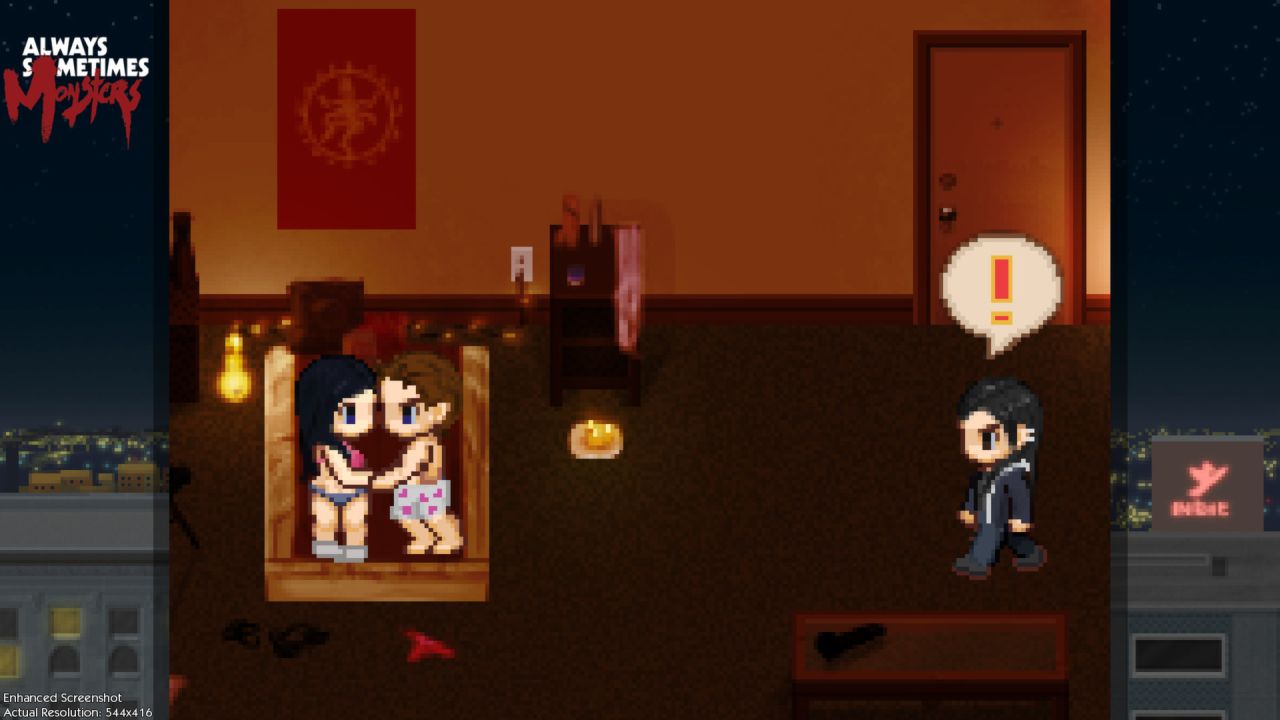
Enough of that, let’s get back to those decisions. Early on the game actually insists that there are no right or wrong choices, and that it’s all just a matter of choosing whatever you want and seeing how it plays out, but such a statement rings just a tad hollow when some sets of choices will leave you with inexplicable fame and fortune and others will leave you dying in a filthy back-alley, sniffing two-stroke petrol out of a crinkled old juice box. How can you possibly present both options as equally viable when one is clearly superior? An ending is supposed to provide a resolution, wrapping up everything the story has been leading up to in such a way that leaves the player satisfied. How can anybody look at an outcome where they have unequivocally failed, get up from the computer and think “I’m glad things went like that”? That’s not an ending, that’s just a game-over screen with its hat brim pulled over its face. I haven’t even touched on the parts of the game where singular decisions can give you a huge advantage, such as when answering a series of questions correctly prevents an office worker from committing suicide, granting you a free ride to the next city and saving you several hundred dollars. Imagine if we extended this to other games. “No, no, being shot five times in the head by that alien grunt halfway through the third level is just an alternative ending. You just chose not to shoot him first because you were staring at a wall, and the game reacted accordingly.”
Even the choices that genuinely provide equally-viable routes often feel constrictive. I like that the game will present you with legitimately challenging moral decisions – making it remarkably difficult to be a good person and still succeed, as opposed to the usual moral choice system in games where you’re just given the option of how much of a knob-head you want to be – but almost everything you do comes in the form of a binary choice between two options. This makes sense for simple choices – steal an item or leave it, agree with somebody or disagree – but the game tends to back you into a corner in order to achieve this format, leaving you to choose between the lesser of the two evils even while an obvious not-evil solution jumps up and down in the background, hand raised eagerly. One story thread has you breaking into a town hall and hacking their server for the express purpose of rigging an election, letting you choose between a candidate who’s corrupt but stable – the person who commissioned you to carry out this little bit of subterfuge – and a candidate who’s rightfully calling for change but might be planning to take things too far. Great, another genuine moral choice. Why do I have to pick one of the two, though? Can’t I just pretend that I hacked the server and lie when I report back to the guy? The story sort of gets around this by telling you that another person will hack the server in the revolutionary candidate’s favour if you don’t get there first, but that leaves us with an extremely pertinent question: why don’t we go back and tell the security forces currently guarding the building that this is going to happen? You see, you can talk about choice all you like, but if you boil everything down to a decision between two options then it’s either going to get awfully contrived, or the plot is going to have so many holes in it that even the world’s most lax building safety committee would condemn it for being structurally unsound.
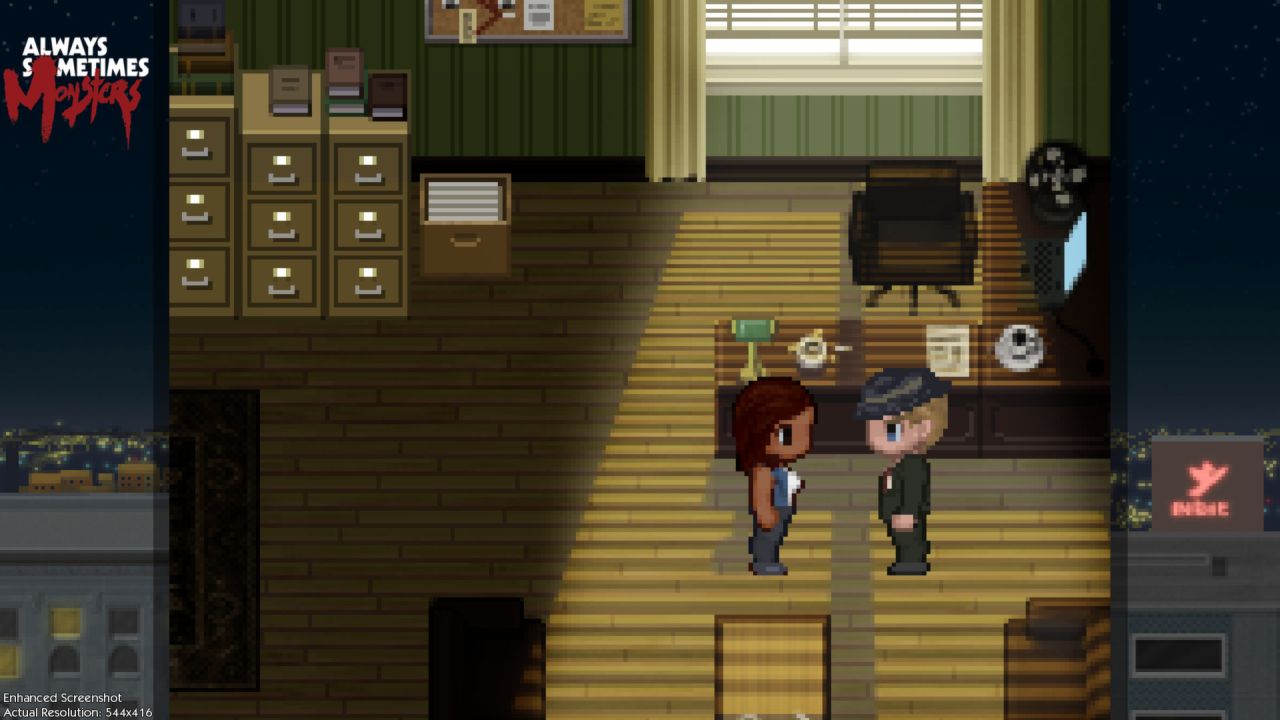
Wait a minute, breaking into a town hall and hacking their election server? Yeah, remember the contemporary cross-country love story we were supposed to be experiencing? Well, every now and then the main story writer must have taken a break, and in these moments I can only presume that his roommate – who has a penchant for spy flicks and whose all-time favourite game is Operation Stealth – sneaked into his room with the intention of spicing things up, slotting in a few paragraphs here and there wherever he could. The story has a perplexing tendency to occasionally drop everything and shift, with barely any set-up, into the realm of the extremely improbable, seemingly for no reason except to make itself seem more interesting than it actually is. As well as our very own ‘Mission Impossible: Small Town Politics Edition’ – which, by the way, also involves somehow being caught by several armed guards and still getting away scot-free without so much as a suspect profile – there’s also a sequence where you sneak into a heavily guarded mansion, and one particular bit very near the end that had me practically gaping with disbelief. I won’t spoil the specifics of that, but it involves a character going ten thousand dollars into debt overnight, Fork Parker turning up out of nowhere, and you getting nearly shot by a hired thug in a casino back-room. The story has to climax one way or another, right?
Unsurprisingly, this all helps contribute to a tone doesn’t so much ‘vary’ as it does ‘swing wildly around like a bedspread in a hurricane’, but it’s not the only cause. While it’s definitely admirable how much the narrative can bend and still get back on track, some of the events just seem like they would have a far more widespread effect than what you actually witness. There’s no urgency, no sense of impact; things just happen, your character reacts to them, and then the status quo is restored. In one such side-story, I witnessed a redneck practically vapourise his nephew with a shotgun, Doom-style, and just barely escaped with my life after bludgeoning the man to death with a tyre-iron. So what did I do now? Call the police? Keel over and whimper for half an hour? Suffer long-lasting psychological damage? Nope, I walked back to town and bought a burger. All that had changed was that I now had an extra hundred dollars in my pocket. Life goes on, I guess.
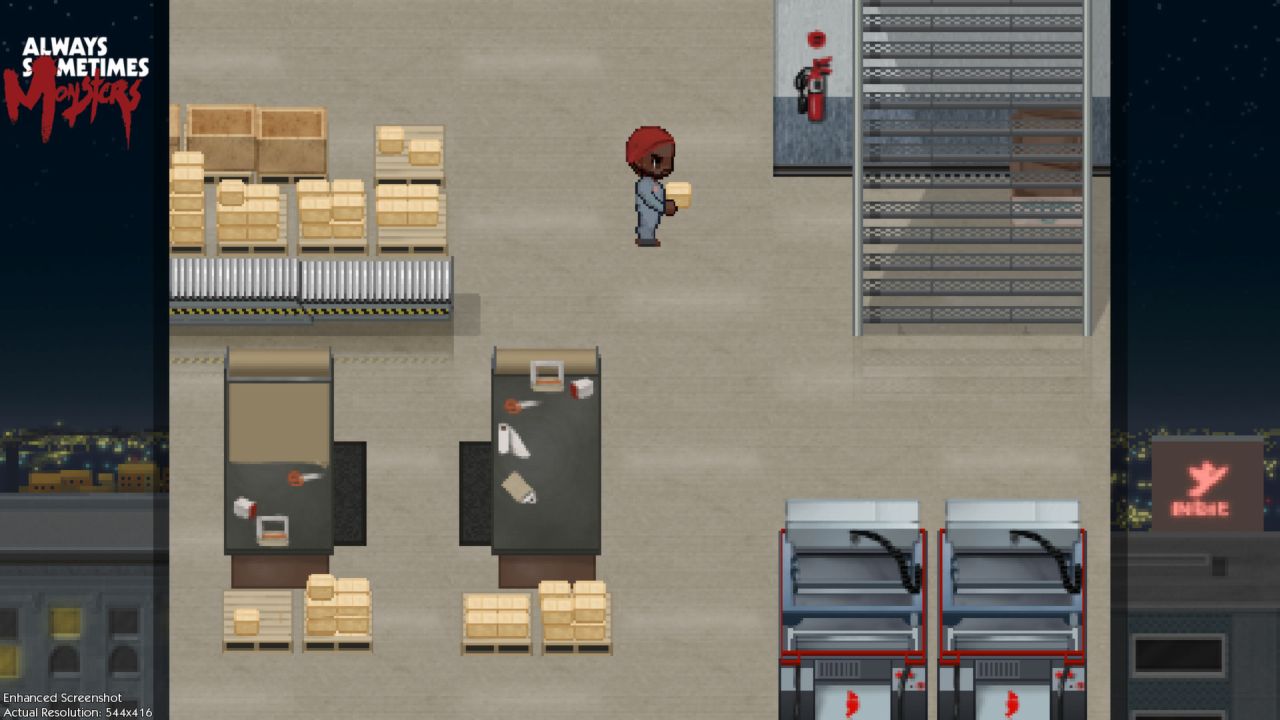
Let me soothe your wounds for a moment, Always Sometimes Monsters. For all the game’s faults, there’s no denying that it’s a remarkable piece of work. It’s intricate, utterly unique and full of compelling dialogue. The one thing it isn’t, however, is fun, which is one feature that seems to be rapidly sliding to the bottom of many indie developers’ priority lists like an unwanted baby in a ball pit. I don’t care if the awful minigames are making a statement; they’re still awful, I still have to play them, and any appreciation I might have of their message is swiftly drowned in tsunami of boredom that they stir up. The game flows like the contents of the waste outlet pipe at the nougat factory, the decisions are more often than not products of improbable circumstances, and the ending that I got wasn’t so much a gripping finale as an excuse to raise an eyebrow and say “is that it?” It’s the kind of game that is significant because of what it represents, rather than what it actually does in practice. What it represents is a truly original style of game driven by genuine moral difficulties; what it actually does is bring across the sense of having a miserable, desperately hopeless life just a little bit too well.
